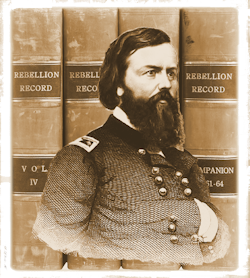February 20.— Gen. Mitchell sent a cavalry force to Russellville, Ky., and captured eleven rebels.—One thousand rebel prisoners, captured at Fort Donelson, Tenn., mostly Mississippians and Texans, left Cairo, 111., to-night, for Chicago.
—Isham G. Harris, rebel Governor of Tennessee, addressed a message to the Legislature of the State, giving his reasons for removing the records of the government to and convening the Legislature at Memphis, in accordance with a joint resolution of the Senate and House of Representatives, providing for such a necessity. He states that the reverses to the confederate arms, leaving the State open from the Cumberland Gap to Nashville; the National victories on the Tennessee and Cumberland Rivers, enabling the enemy to penetrate the heart of the State with impunity, and the fact that Gen. Johnston had fallen back south of Nashville, with his army, had left the State capital in a wholly defenceless condition. The removal to Memphis then became unavoidable. He complains of the difficulties he had found in organizing well-disciplined and equipped troops for the confederate government, urges a remodelling of the State militia system, and expresses his conviction that the invader will yet be driven from the soil of Tennessee.—(Doc. 59.)
— This morning the United States steamer Stepping Stones, with a launch and boat’s crew from the Yankee, went on a reconnoissance up Occoquan Creek, Va., some four miles. Lieut. Eastman sent out Acting Master Lawrence with the launch, who visited the north and south shores of the creek, penetrating a short distance into the interior, but without finding any signs of the rebels. Just as the launch was leaving the south side of the creek, a brisk fire was opened on them by the rebels, from five or six field-pieces posted in a clump of woods. Some forty shells were thrown by the enemy, all of which flew uncomfortably near the Stepping Stones, but doing no damage save slightly tearing the flag. The fire was returned from the Stepping Stones, and a howitzer in the launch plunged a shower of rifled shot into the cover of the rebels, which undoubtedly damaged them, as their fire soon slackened.—(Doc. 53.)
—The Richmond Enquirer of this date, says: “An immense defence meeting was held in Memphis, Tenn., last week. Resolutions were passed, appointing committees in each ward of the city, to form a complete military organization, and to drill the levies. It was also resolved that the times demanded the proclamation of martial law in Memphis. In the afternoon, most of the stores on Front row, and many of these on Main street, closed their doors, in compliance with a proclamation from the Mayor. A considerable number of citizens, who had given in their names to join the defence organization, met in the Council Chamber in the evening, and went out in procession to drill.”
—Winton, N. C, was burned by the forces of Gen. Burnside. The Federal troops, with gunboats, ascended the Chowan River, where the rebels opened a heavy fire upon them. The National troops landed and destroyed the town. —(Doc. 54)



